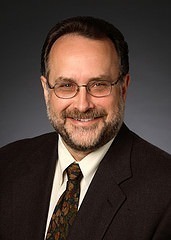Author: Kay Tillow
The Future of Healthcare: Single Payer & Its Alternatives
|
|
|
|
Garrett Adams, MD, MPH, honored with Lifetime Achievement Award
The Kentucky Alliance Against Racist and Political Repression honored Dr. Garrett Adams with a Lifetime Achievement Award for his leadership in the single payer/improved Medicare for All movement. The award was presented on December 7, 2019, at the 22nd Annual Alliance Unity Dinner celebrating the 45th year since the founding of the Alliance.

Dr. Adams was born in Nashville, Tennessee. He is a graduate of Vanderbilt University and Wake Forest School of Medicine, where he was recognized as a Distinguished Lecturer.
He completed pediatric residency at Vanderbilt University Hospital and Children’s Hospital of Los Angeles, and Pediatric Infectious Disease Fellowship at the University of Colorado.
He has a Master of Public Health from Johns Hopkins University Bloomberg School of Public Health by whom he was recently recognized with the Distinguished Alumnus Award.
In 2014 he was the Granger Lecturer at the Yale Child Study Center, Yale University School of Medicine.
He is retired from the full-time faculty of the University of Louisville School of Medicine where he was Chief of Pediatric Infectious Diseases and Medical Director of Communicable Diseases at the Louisville Metro Health Department.

During his forty-year career he attended the health care needs of sick children and their young families. He witnessed deterioration in health care access and health care delivery in the United States and now works for health care reform as a member of Physicians for a National Health Program (www.PNHP.org). He is a founding member of PNHP-Kentucky (www.kyhealthcare.org), a member of the national Board of PNHP, and was national President of PNHP 2010-2012.
He is the founder (2010) and Medical Director of the Beersheba Springs Medical Clinic, Beersheba Springs, Tennessee, a not-for-profit, volunteer clinic in the Cumberland mountains of Tennessee (www.beershebaclinic.org).
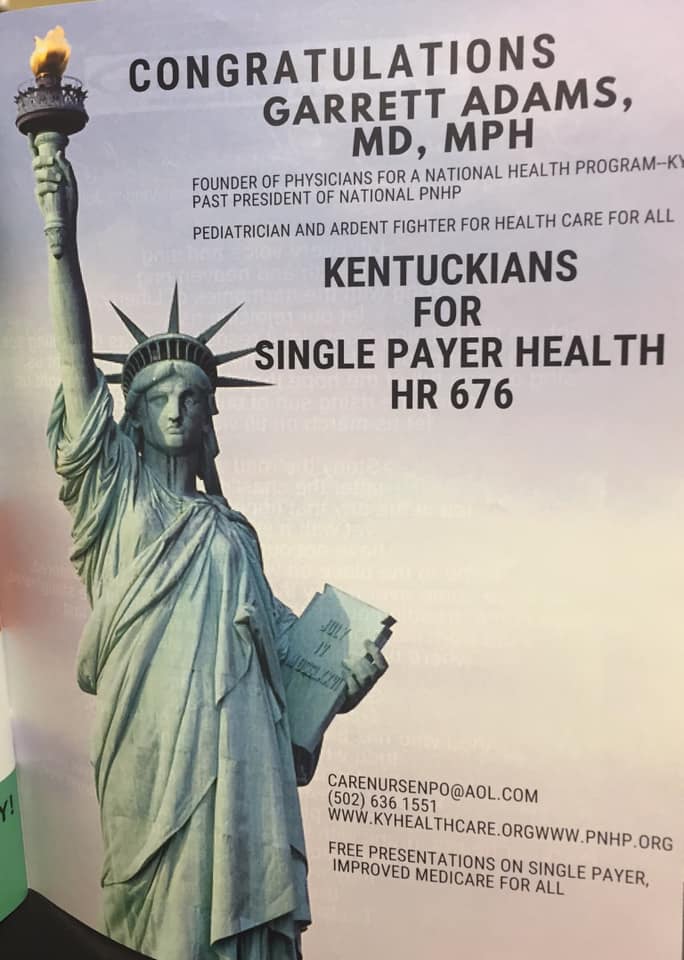
In 2011 he testified to the U.S. Senate on “Is Poverty a Death Sentence”, based on his experience in Appalachia.
Congratulations, Dr. Adams, from all of us at Kentuckians for Single Payer Health Care!
Thanks to Carrie Irwin for the photos.
Dr. Wayne Tuckson interviews Gerald Friedman on Medicare for All
Dr. Wayne Tuckson, a Louisville colorectal surgeon, past president of the Greater Louisville Medical Society, and host of Kentucky Health interviews economist Gerald Friedman on the meaning and financing of Medicare for All. The interview took place on October 24, 2019.
https://video.ket.org/video/health-insurance-for-all-what-does-it-mean-ebmtcm/
Professor Gerald Friedman makes “The Economic Case for Medicare for All”
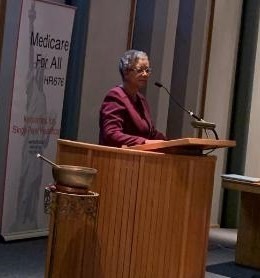
(Video of event by Stephen Mattingly is here.)
On October 24, 2019, at 7 pm, economist Gerald Friedman presented the Economic Case for Medicare for All to a full house at the Unitarian Church on 4th street in downtown Louisville.
Dr. Karen Krigger, who practices Family and Geriatric Medicine in Louisville, opened the program with remarks about the current crises in health care in Louisville.
Kentuckians came from as far away as Richmond to hear Dr. Friedman.
Dr. Garrett Adams, pediatrician and past president of the Physicians for a National Health Program, introduced Friedman who earned his doctorate in economics at Harvard and currently teaches at the University of Massachusetts at Amherst.
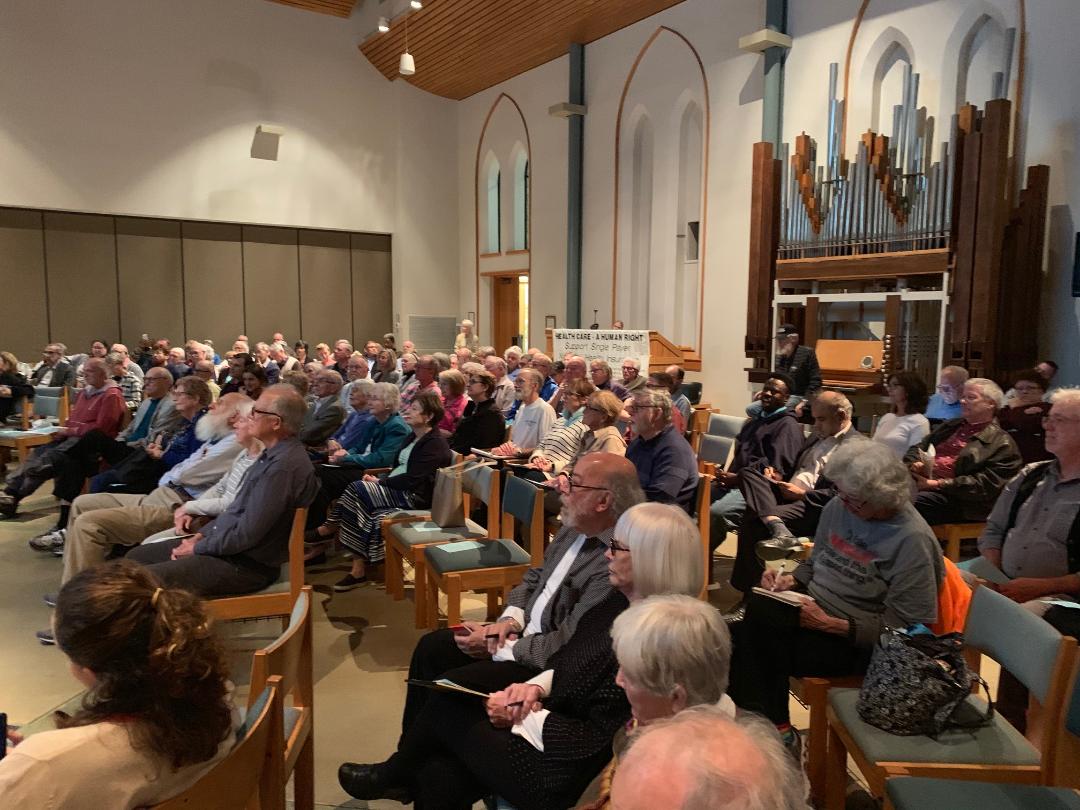
Dr. Friedman is an expert on the financing of single payer health care systems. He studied HR 676, the Expanded and Improved Medicare for All legislation, introduced in the House by Congressman John Conyers.
He found that over $500 billion could be saved each year by switching to this single payer program.
Dr. Friedman’s presentation gave compelling evidence that people in the United States are victims of an inferior health care system that brings suffering and early death to those who do not have the ability to pay the high cost of care.
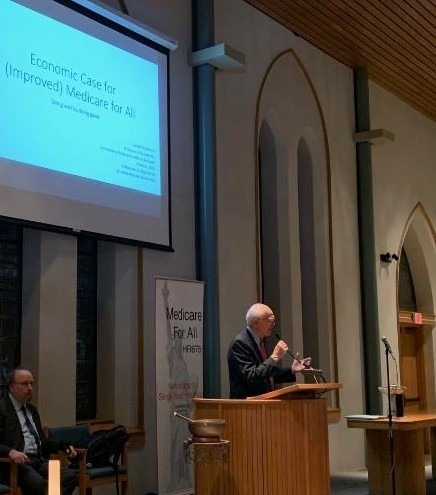
He presented evidence that the U. S. spends more than twice, per capita, on health care as the other wealthy countries yet has poorer outcomes in life expectancy and other measures of quality.
He showed that, contrary to insurance company claims, additional funds spent on care produce improved outcomes and longevity. He gave the figures that prove that co-pays and deductibles and the high cost of drugs are causing irreparable harm to Americans.
His studies show that one-third of Americans are going without necessary care because of the high costs even for those who have health insurance plans.
He gave compelling evidence that a national single payer health care system, an improved Medicare for All, would save money yet improve care for those who now have insurance and extend those benefits to the 3o million who have been left without coverage despite the gains of the Affordable Care Act.
The program can be seen on the Kentuckians for Single Payer Health Care facebook page, thanks to medical student Sarah Parker.
https://www.facebook.com/KSPHmed4all/videos/2334827763293174/
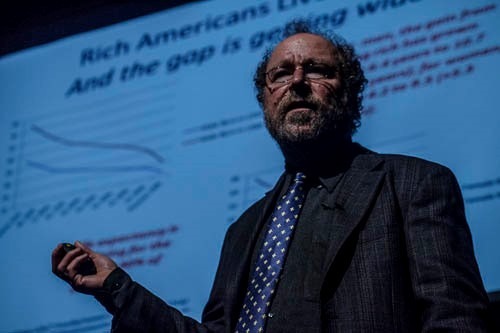
Professor Gerald Friedman presents the Economic Case for Medicare for All to physicians at two grand rounds
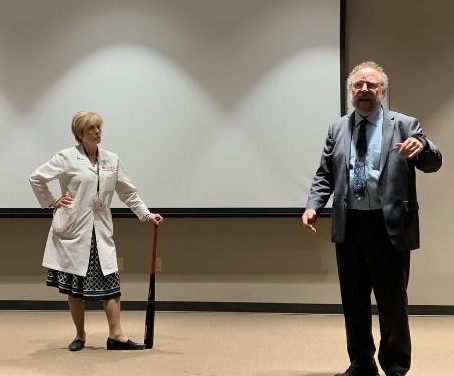
On Thursday, October 24, 2019, economics Professor Gerald Friedman spoke on what Medicare for All would mean for physicians. The Grand Rounds was sponsored by the University of Louisville Department of Medicine. The program took place in the Ambulatory Care Building at University of Louisville Hospital. A video is available here.
On Friday, October 25, 2019, Dr. Friedman addressed the Grand Rounds of the University of Louisville Department of Family and Geriatric Medicine. This event was at Jewish Hospital in Bottigheimer Auditorium.

Prof. Gerald Friedman addresses the health care issues of the African-American Community
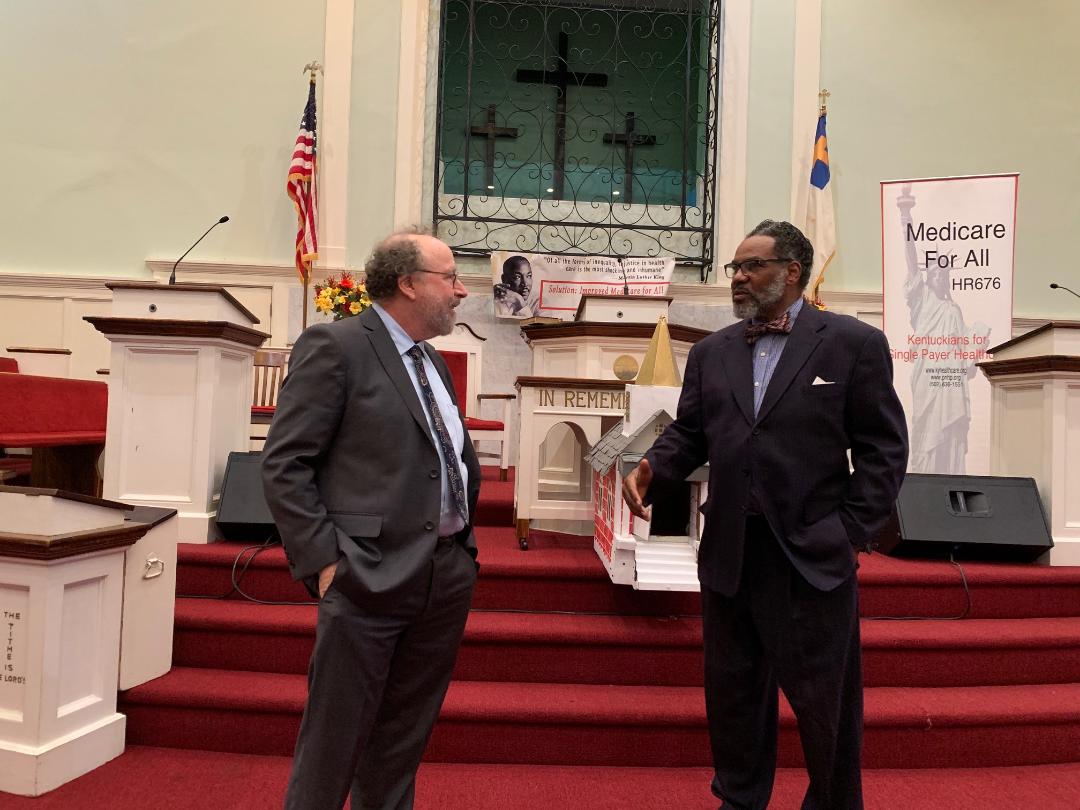
At noon on October 24, 2019, Professor Gerald Friedman spoke at the West Chestnut Street Baptist Church on the topic “Medicare for All means health equity for all.”
Following a rendition of “Lift Every Voice and Sing” Rev. Ron Robinson, Dr. Garrett Adams, and Bob Cunningham made opening remarks.
Professor Friedman gave a power point presentation and answered questions from the audience. Friedman said that the nation must provide care to all through a single payer system that removes the profits of the insurance companies and ends co-pays and deductibles so that no one goes without care because of inability to pay. He said that health care is a human right.
Cornelia Oldham made a video of the event and graciously shared it. It can be viewed here.
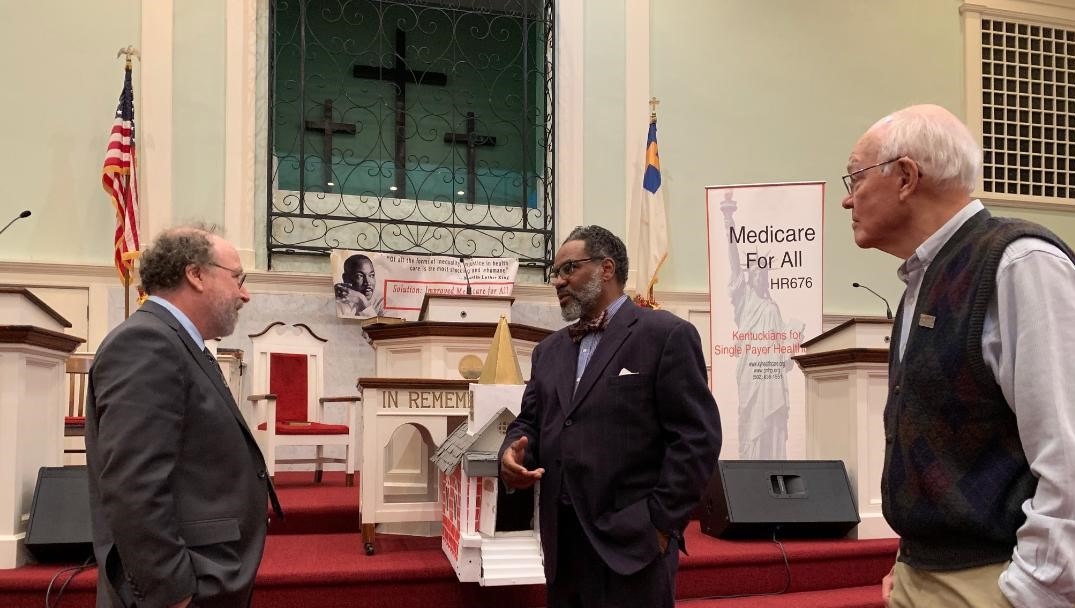
The program was organized by Antonio Wickliffe, Bob Cunningham, and the Rev. Ron Robinson and sponsored by Kentuckians for Single Payer Health Care. Refreshments were catered by Sweet Peaches.
Dr. Martin Luther King, Jr. spoke frequently at the West Chestnut Street Baptist Church which was deeply involved in the civil rights struggle in Louisville.
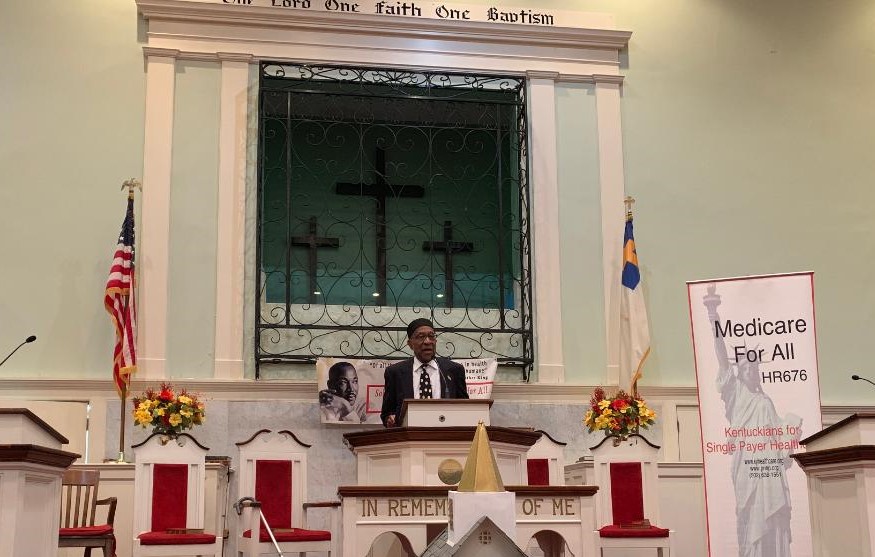
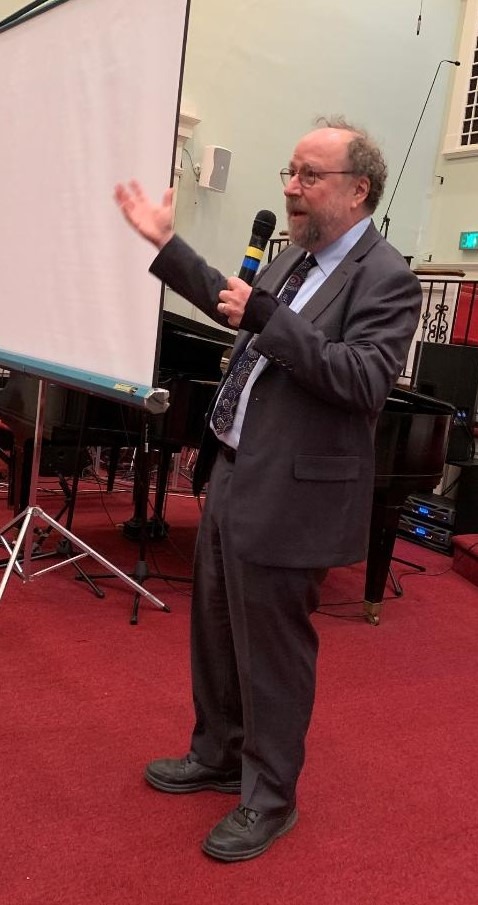
UofL Medical Students Host Single Payer Event with Economist Gerald Friedman

(Video of event here.)
On October 23, 2019, the University of Louisville Chapter of Students for a National Health Program (SNaHP) sponsored an event that featured economics Professor Gerald Friedman speaking about what Medicare for All means for future physicians.
Students filled the auditorium, listened attentively, responded to Friedman’s humor, and asked intelligent questions.
An hour before the event, Deborah Yetter of the Courier Journal interviewed Dr. Friedman and the leaders of SNaHP. The story appeared on the following day and can be read here. Yetter also spoke briefly about the student program on Comment on Kentucky which can be viewed here.
Friedman, who has a doctorate in economics from Harvard and teaches at UMass Amherst, was introduced by SNaHP president, Sarah Riley Parker.

The Economic Case for Medicare for All
Hear Economics Professor Gerald Friedman, Ph.D., speak on the funding of a single payer, improved Medicare for All health care system.

Thursday, October 24, 2019
7:00 pm
First Unitarian Church
809 S. 4th St., Louisville 40203
Preliminary remarks by Karen Krigger, MD, Family Medicine
Professor Friedman was a Phi Beta Kappa member and Magna Cum Laude graduate of Columbia University. He obtained his doctorate from Harvard University, where he received a Certificate of Excellence in Undergraduate Teaching.
He has written extensively on the funding of single payer health care systems.
In his study “Funding HR 676: The Expanded and Improved Medicare for All Act — How we can afford a national single-payer health plan,” he outlines the costs and benefits of Rep. John Conyers’ national single-payer legislation.
He has provided expert testimony in the US Senate on his study of the financial analysis of single payer national health insurance.
Sponsored by: Kentuckians for Single Payer Health Care, PO Box 17595, Louisville, KY 40217, www.kyhealthcare.org, nursenpo@aol.com, 502 636 1551
While in Louisville, Dr. Friedman will speak at other major events:
“Medicare for All — What future physicians need to know”
Wed. Oct. 23, 2019
12 Noon
U of L Medical School Instructional Bldg, Rm 102, 500 S. Preston, Louisville
Sponsored by U of L Students for a National Health Program (SNaHP).
Grand Rounds: “Medicare for All – What physicians need to know”
Thursday, October 24, 2019
8:00 am
Ambulatory Care Building, 550 S. Jackson St.
Sponsored by the U of L Department of Medicine
Gerald Friedman to speak at the W. Chestnut St. Baptist Church
“Medicare for All Means Health Equity for All”
Thur. Oct. 24, 12 Noon, 1725 W. Chestnut St.
Grand Rounds: “Medicare for All – What physicians need to know”
Friday, October 25, 2019,
8:00 am
Bottigheimer Auditorium,
Jewish Hospital, 200 Abraham Flexner Way
Sponsored by U of L Department of Family Medicine and Geriatrics
Sarah Riley Parker spoke at the KMA in support of a resolution for single payer health care

This is Sarah Riley Parker, second year student at U of L Medical School. A couple of weeks ago she spoke at the Kentucky Medical Association annual meeting, urging this physicians’ organization to support national single payer healthcare. Her resolution was an awesome step towards educating and winning these Kentucky doctors to support the health care reform that works! Her resolution received about 10% of the vote.
Sarah is from Murray, Kentucky, and is passionate about bringing excellent care to rural communities. She is also the President of the Louisville Chapter of Students for a National Health Program (SNaHP).
Sarah is organizing an event for medical and other health professional students to be held at 12 N on Wed., Oct. 23, in Room 102 of the Instructional Bldg., 500 S. Preston, downtown Louisville. The speaker is Professor Gerald Friedman, the nation’s leading economist on the funding of single payer health care systems. http://kyhealthcare.org/…/wed-oct-23-2019-12-noon-professor…
